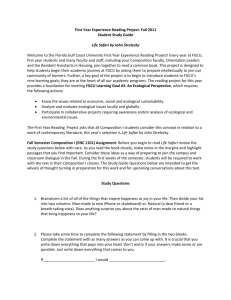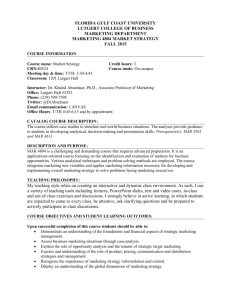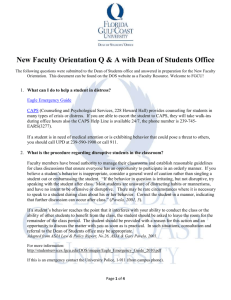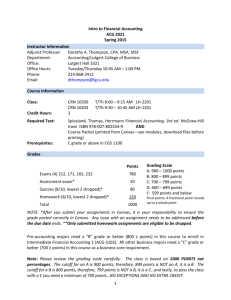MAP 2302 - Differential Equations (CRN 10544), Spring 2015
advertisement
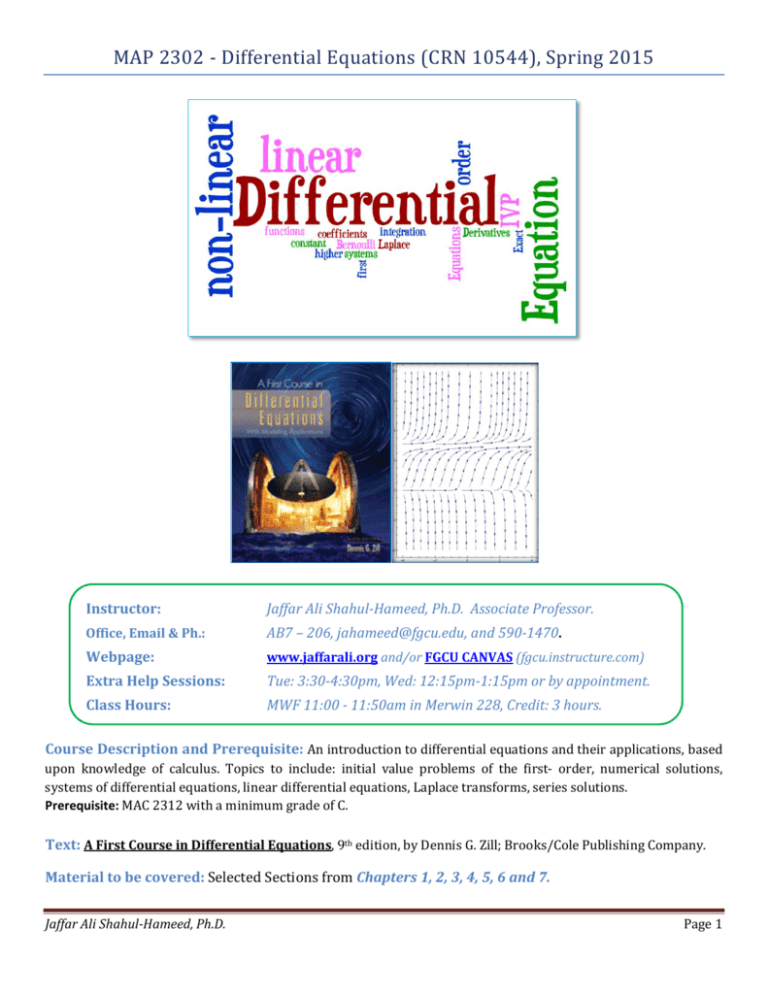
MAP 2302 - Differential Equations (CRN 10544), Spring 2015 Instructor: Jaffar Ali Shahul-Hameed, Ph.D. Associate Professor. Office, Email & Ph.: AB7 – 206, jahameed@fgcu.edu, and 590-1470. Webpage: www.jaffarali.org and/or FGCU CANVAS (fgcu.instructure.com) Extra Help Sessions: Tue: 3:30-4:30pm, Wed: 12:15pm-1:15pm or by appointment. Class Hours: MWF 11:00 - 11:50am in Merwin 228, Credit: 3 hours. Course Description and Prerequisite: An introduction to differential equations and their applications, based upon knowledge of calculus. Topics to include: initial value problems of the first- order, numerical solutions, systems of differential equations, linear differential equations, Laplace transforms, series solutions. Prerequisite: MAC 2312 with a minimum grade of C. Text: A First Course in Differential Equations, 9th edition, by Dennis G. Zill; Brooks/Cole Publishing Company. Material to be covered: Selected Sections from Chapters 1, 2, 3, 4, 5, 6 and 7. Jaffar Ali Shahul-Hameed, Ph.D. Page 1 Professor's Philosophy • • • • • • • • This course is challenging and I am not an “easy” professor. Homework is meant to provide practice in preparing for exams, not just as a grade booster. I will not give you a grade you wish, you have to work hard to earn the grade that you want. You will get a grade that you deserve. The textbook prescribed are meant to read regularly not just to buy. I will cover most, but not all, material in the text. Students are expected to be able to read the text and learn material not explicitly covered in the class lectures. A good educator presents material to imbue knowledge on the learners and does not simply teach to an exam. Timed exams can only test some of the knowledge/skills, not all. At the college level, the student is responsible for his/her own education. I do my best to present the material as simple as possible, but I cannot ensure that the student: o does his/her homework and actually works out the problems o studies appropriately. Lack of attendance, poor study habits, and last-minute" studying are sure ways of failing my class. If you put the effort into learning the material, I am certain that would not only help pass my class, but leave with a more educated and savvy perspective about the world and the subject. At the college level, the student is responsible to manage his/her own time according to the subject to excel in the class. If he/she just attends the class and expects to excel the course, then that is a fallacy. The student has to spend time outside the class to learn, revise, review and understand the material discussed in the class to excel in the subject. Grading Policy: Assignments Two In-class Exams (20% each) Quizzes, Homeworks, Projects (25%) and Attendance (5%) Final Exam Points % 40% 30% 30% Percentage Ranges for Letter Grades: % Grade 91- 100 A 89-91 A- 86-89 B+ 82-86 B 78-82 B- 76-78 C+ 70-76 C 60-70 D 0-60 F Exams: There will be TWO in-class Exams (each worth 20% of the course grade) and a Final Exam (30% of the course grade). Jaffar Ali Shahul-Hameed, Ph.D. Page 2 Quizzes, Home/Group-work and Projects: There will be group works/quizzes on randomly selected days (may be every day). It is absolutely essential to work a large number of problems on a regular basis. Problem assignments are given in the class website. I cannot accept assignments via email. Hardcopies of homework/groupwork must be turned in during class or in my office unless otherwise mentioned. LATE ASSIGNMENTS WILL NOT BE ACCEPTED**. Homework/group-work is collected solely as a learning device to help you master the ideas and techniques. As a university level student, it is essential for you to allocate your time so as to learn the most with the least effort. The homework assignments are the bare minimum for most students to gain basic familiarity with the material. As manager of your own education, it is up to you to work whatever additional problems may be necessary for you to achieve a good understanding of the subject. You may consult with other students about the homework problems; indeed I encourage you to do so. However, you will need to write up the solutions in your own words. It is a complete waste of time to just copy from a solutions manual or from someone else’s work. If you decide to turn in work that is not your own, I cannot stop you, but you will not learn the material adequately and you will pay a heavy price on the exams which constitute 70 percent of your course grade. For help, you should come to my office hours, or make an appointment with me to come at another time. Email is the best way to contact me. But it is the worst method to explain an answer for a math question. Attendance: You are expected to attend every class and are responsible for all information given out during them. This course requires your full effort, so it is expected that you will give your complete attention to the instructor for the full class period. Activities such as sleeping, reading, listening to headsets, operating unapproved electronics (e.g. cell phones, computers, PDA), conversing with other students, and so on do not constitute class participation. Please turn off all unapproved electronics during class periods. Students engaging in such behavior during the lecture may be asked to leave the room. If you are absent and miss an announcement, assignment, a lesson plan change, or some handout you are responsible to seek out that information from a classmate. Office hours will not be used to re-teach a lesson missed due to student absence. If you miss an in-class exam with ‘legitimate’ reason, final comprehensive exam percentage will replace that exam. Attendance will be taken on random days (may be every day). There will be 5% points for the attendance. A percentage will be deducted for each recorded missing class. University authorized/approved excuses will be exempted. For more information, read the catalog (http://www.fgcu.edu/catalog/08-09/FullFGCUCatalog0809.pdf). Students with more than 8 recorded absences will be asked to be removed from the class for the rest of the semester via the Registrar’s Office. Grade Disputes: If you have a dispute with a grade recorded by the instructor, you must present the graded assignment to the instructor in order to obtain a change-of-score. It will be your responsibility to keep all of your returned assignments. Scores will NOT be changed without the original assignment being presented to the instructor. Important Days: Check Gulfline (gulfline.fgcu.edu) for the latest update on the Final Exam, Drop Dates, etc., and those dates are final. Jaffar Ali Shahul-Hameed, Ph.D. Page 3 Email Communication Email communication will be done through the FGCU system to your FGCU email account (……..@eagle.fgcu.edu) or FGCU Angel account. It is your responsibility to check your accounts often. In order to improve the communication and to assist the instructor in replying to emails in a timely manner, this email policy will be strictly enforced. When sending emails to your instructor, the following rules must be adhered to: 1. The subject line of the email must contain the course name 2. The email must be signed with your first and last name. 3. The email must be written in Standard English. If your email does not meet the above criteria, you must resubmit your email in the proper format in order to receive a reply. I usually reply to emails within two business days. If you do not receive a reply within that time frame, check that your email was sent in the proper format and resubmit if necessary. I thank you in advance for sending your emails as requested. Academic Behavior Standards and Academic Dishonesty: All students are expected to demonstrate honesty in their academic pursuits. The university policies regarding issues of honesty can be found in the FGCU Student Guidebook under the Student Code of Conduct and Policies and Procedures sections at http://studentservices.fgcu.edu/judicialaffairs/new.html. All students are expected to study this document which outlines their responsibilities and consequences for violations of the policy. In all course work, assignments and examinations, students are expected to adhere to the following Code of Honor: "As a Florida Gulf Coast University student I will conduct myself with honor and integrity at all times. I will not lie, cheat, or steal, nor will I accept the actions of those who do." This policy applies in particular to our homework assignments. Discussing assignments with other members of the class is permitted, even encouraged, but the work that you turn in should be your own. If you don't understand an argument, don't take credit for it. Verbatim copying is not acceptable. Academic dishonesty will be dealt with according to the FGCU policy. For More information, read the booklet "Student Code of Conduct". Disability Accommodations Services: If you need to request an accommodation in this class due to a disability, or you suspect that your academic performance is affected by a disability, please contact the Office of Adaptive Services. The Office of Adaptive Services is located in Howard Hall 137. The phone number is 239-5907956 or TTY 239-590-7930 Student Observance of Religious Holidays: Kindly visit the following webpage for full university policy at the General Counsel Policies: http://www.fgcu.edu/generalcounsel/policies-view.asp Electronic Devices: All pagers, cell phones and other electronic equipment should be turned off during class. This includes text messaging. Checking email or browsing during the class is considered as inappropriate and disruptive behavior. Violators will be asked to leave the class or directed to appropriate authorities/offices. This syllabus is subject to change at the instructor's discretion. Name (PRINT):_____________________________________________________ Date:_________________________________ Jaffar Ali Shahul-Hameed, Ph.D. Signature:__________________________________________________ Page 4

